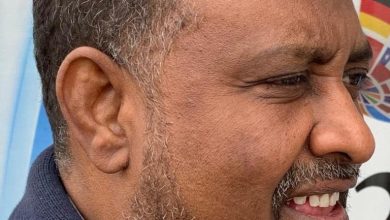A Serious Conflict in the Horn of Africa

Martin Plaut
The Horn of Africa, encompassing Somalia, Djibouti, Ethiopia, and Eritrea, is witnessing ongoing tensions, affected by wars, civil conflicts, and crises stemming from long-standing jihadist insurgencies in Somalia. External powers, especially those from the Gulf region, are competing for the loyalties and resources of this area.
In recent months, tensions have escalated unprecedentedly, with a dispute arising over access to ports between Ethiopia on one side and Somalia and Eritrea on the other, drawing regional powers such as Egypt, Turkey, and the UAE into the conflict. The dispute over the ports began in January when Ethiopia signed a memorandum of understanding with “Somaliland” (an internationally unrecognized republic). Under this agreement, Ethiopia planned to lease part of the coast to build a naval base.
This conflict threatens to fuel further strife in the region, particularly with the growing influence of the jihadist group al-Shabaab in Somalia. This agreement has angered Somalia, which considers “Somaliland” part of its territory. Somali President Hassan Sheikh Mohamud primarily blamed Ethiopian Prime Minister Abiy Ahmed. In an interview with The Economist on September 30 in the Somali capital, Mogadishu, Hassan Sheikh Mohamud said, “Abiy is the bad guy in the region,” referring to the unpredictable behavior of the Ethiopian leadership.
Initially, it seemed that many countries in the region supported Somalia. Both the African Union and the Intergovernmental Authority on Development (IGAD), an East African regional bloc, issued statements supporting Somali “territorial integrity.” The United States and the European Union did the same. Turkey, which is one of the most important foreign investors in Somalia, pledged to send troops to protect Somalia’s maritime borders. However, observers have recently expressed concern about the Somali president’s escalating moves. In June, he threatened to expel thousands of Ethiopian peacekeepers deployed in Somalia as part of the African Union mission against al-Shabaab.
In August, Hassan Sheikh Mohamud visited Egypt and signed a military cooperation agreement with President Abdel Fattah al-Sisi. Egypt committed to supplying Somalia with weapons and possibly sending thousands of troops as part of a new African Union peacekeeping mission set to begin next year. Since then, two shipments of Egyptian arms have arrived in Mogadishu.
Playing with Fire
Many foreign diplomats and analysts view this security agreement as a serious escalation, especially given the antagonistic relations between Ethiopia and Egypt. The two countries have been at odds since Ethiopia began constructing the Grand Ethiopian Renaissance Dam on the Blue Nile near its border with Sudan in 2011. Egypt heavily relies on Nile waters and sees the dam as an existential threat, previously threatening to bomb it. In December, Egypt stated that negotiations to reach a compromise had “failed.”
Ethiopia is also concerned about the growing relationship between Somalia and Eritrea. One of the motivations for Ethiopia’s agreement with “Somaliland” is the collapse of a previous agreement with Eritrea that allowed Ethiopia to access the sea through northern Eritrean ports. This agreement was part of the peace treaty between the two countries signed in 2018, which awarded Ethiopian Prime Minister Abiy Ahmed the Nobel Peace Prize, but it collapsed following the civil war in Ethiopia in 2022.
Dividing the Horn
This tension has led to the strengthening of new alliances in the region. While Somalia, Eritrea, and Egypt seem closer to Turkey and Saudi Arabia, Ethiopia, “Somaliland,” and some regional Somali entities align with the UAE. Amidst these disputes, Ethiopia is striving to find maritime outlets, especially after losing direct access to the sea in 1993 when Eritrea seceded. Abiy Ahmed seems to be attempting, through his agreement with “Somaliland,” to compensate for this loss. In contrast, Somalia is pushing for stronger relations with Eritrea and Egypt, further complicating the situation in the Horn of Africa.
Isaias Afwerki, the president of Eritrea since its independence in 1993, has hosted the Somali president twice this year in the capital, Asmara. Talks are underway between Eritrea and Egypt regarding a military cooperation agreement and intelligence sharing. If a formal triad alliance is established between Egypt, Eritrea, and Somalia, it would further isolate Ethiopia in the region.
Consequences of Escalation
The escalation of this geopolitical conflict could lead to the division of the Horn of Africa into two political blocs: Egypt, Eritrea, and Somalia allied with Saudi Arabia and Turkey, while Ethiopia, “Somaliland,” and some regional Somali factions ally with the UAE. The situation is further complicated by the conflict in Sudan, where Egypt and its allies support the Sudanese army, while the UAE backs Ethiopia and the paramilitary Rapid Support Forces in Sudan.
Despite these tensions, Abiy Ahmed has remained steadfast in his position. On September 8, he issued a fiery statement, indicating that Ethiopians are “humiliated and deter those who dare to attempt to invade them.” The Ethiopian Chief of Staff criticized Egypt, calling it a “historical enemy.” In turn, the Somali president accuses Ethiopia of conducting a sabotage campaign against his country, including supplying arms to Somali clan militias along the shared border.
Future Ramifications
These tensions could exacerbate the security situation in Somalia. Despite the progress made by the Somali government against the jihadist group al-Shabaab, ongoing fighting with clans and internal divisions threaten to re-empower al-Shabaab in rural areas surrounding Mogadishu. Moreover, the Somali president faces growing opposition from some Somali regions, particularly the southwestern state near the capital.
Amidst all these developments, the prospects of a direct war between Ethiopia and Somalia or between Ethiopia and Egypt remain low; the Somali army is not strong enough to confront Ethiopia, and Abiy Ahmed is preoccupied with internal conflicts in the Amhara region. However, there are concerns that these tensions could ignite a new war between Ethiopia and Eritrea, especially if Abiy Ahmed attempts to seize Eritrea’s Red Sea ports, a possibility that cannot be entirely ruled out.
Threat to Regional Stability
Even in the absence of a full-scale war, the dispute over port access could further destabilize the region. Negotiations held between Ethiopia and Somalia mediated by Kenya and Turkey have yielded little progress, and a new round of talks scheduled for September has been indefinitely postponed. The Somali president emphasized that “the establishment of a naval base in Somali territorial waters is a red line we cannot accept.”
Abiy Ahmed appears to be relying on a strategy of delay, continuing negotiations while trying to impose “facts on the ground.” The UAE is believed to be indirectly supporting Ethiopia, preferring that Ethiopia utilize a UAE-owned port in the coastal city of Berbera in “Somaliland” rather than establishing a new naval base.
The Risk of Security Vacuum
As the deadline for the withdrawal of Ethiopian peacekeepers approaches on January 1, many fear that the exit of these troops could create a security vacuum that the extremist al-Shabaab group could exploit. Analysts warn that the withdrawal of Ethiopian forces without an adequate replacement, especially if not replaced by neutral international forces, could lead to a severe deterioration of the security situation, allowing the jihadist group to regain strength in large areas of Somalia.
It is clear that all parties need to return to the negotiating table as soon as possible to avoid exacerbating the conflict and deteriorating stability in the Horn of Afric



